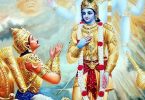Question: Given there is an all encompassing God/Krishna and given there is reincarnation and Karma, see Bhagavad-Gita 18.17, “One who is not motivated by false ego, whose intelligence is not entangled, though he kills men in this world, does not kill. Nor is he bound by his actions.”
This seems contradictory to me. The proof of a false ego is to dominate and control another unto death (killing). It is not right to kill people and keep them away from their purpose in this life. No one has the right to retard the education of another. Saying he is not bound by his actions contradicts the concept of Karma.
Answer by Romapada Swami: Karma in a general sense means material activities for which one incurs subsequent reactions. It can be further divided into three:
1) Karma– actions based on scriptures bringing good reactions;
2) Akarma – actions or work relating to the pleasure of Vishnu or Krishna or as Prabhupada writes Krishna-karma. Such work brings no material reaction, (good or bad) and finally
3) Vikarma – actions against the injunctions of scriptures or sinful which brings bad reactions.
Both 1) and 3) are binding to the soul but 2) is not binding.
A careful reading of BG Chapter 3, especially Srila Prabhupada’s purports, will help devotees understand how activities or karma binds one and how the same activities when used for the service of the Lord does not bind one.
This type of work, known as karma yoga, is further elaborated by Krishna in Chapter 5.
What the reader will come to understand is that action in Krishna consciousness is transcendental to the reactions of good or evil work and therefore it is not binding but rather liberates the soul from all karma eventually.
There are several statements by the Lord in the Bhagavad-gita which support this.
In Chapter 2 verse 51, Krishna says: “By thus engaging in devotional service to the Lord, great sages or devotees free themselves from the results of work in the material world. In this way they become free from the cycle of birth and death and attain the state beyond all miseries” [by going back to Godhead].
In Chapter 3 verse 31, Krishna says: Those persons who execute their duties according to My injunctions and who follow this teaching faithfully, without envy, become free from the bondage of fruitive actions.” In the purport Srila Prabhupada writes, ‘But an ordinary man with firm faith in the eternal injunctions of the Lord, even though unable to execute such orders, becomes liberated from the bondage of the law of karma. In the beginning of Krishna consciousness, one may not fully discharge the injunctions of the Lord, but because one is not resentful of this principle and works sincerely without consideration of defeat and hopelessness, he will surely be promoted to the stage of pure Krishnaconsciousness.’
In Chapter 4 verses 14, 16, 17 and 18, Krishna says:
14. There is no work that affects Me; nor do I aspire for the fruits of action. One who understands this truth about Me also does not become entangled in the fruitive reactions of work.
16. Even the intelligent are bewildered in determining what is action and what is inaction. Now I shall explain to you what action is, knowing which you shall be liberated from all misfortune.
17. The intricacies of action are very hard to understand. Therefore one should know properly what action is, what forbidden action is, and what inaction is.
18. One who sees inaction in action, and action in inaction,is intelligent among men, and he is in the transcendental position, although engaged in all sorts of activities.
In the purport to verse 18, Srila Prabhupada writes, ‘A person acting in Krishna consciousness is naturally free from the bonds of karma. His activities are all performed for Krishna; therefore he does not enjoy or sufferany of the effects of work.’ This is akarma or Krishna-karma and therefore it is not binding but liberating.
This is what Krishna is speaking about in Chapter 18 verse 17. And therefore there is no contradiction.
***
One additional point is that in Vedic culture everyone is expected to perform their prescribed duties to progress in the path of purification. This also directly relates to karma. If duty is performed according to scriptural injunctions with the intention to enjoy the fruits of action, then it is binding. Similarly if prescribed duties are not performed it becomes sinful and it is also binding.
The safest route is to perform one’s duty without attachment to the results. In the case of Arjuna, he was advised by the Lord to fight as a matter of duty without attachment to the result. Arjuna’s prescribed duty as a ksatriya was to administer the Vedic laws of the mankind and to protect the citizens from unrightousness. This may require killing. The kastriyas are allowed to kill within the scope of religious law. According to Vedic injunctions there are six kinds of aggressors: (1) a poison giver, (2) one who sets fire to the house, (3) one who attacks with deadly weapons, (4) one who plunders riches, (5) one who occupies another’s land, and (6) one who kidnaps a wife. Such aggressors are at once to be killed, and no sin is incurred by killing such aggressors. In fact when such aggressors are killed lawfully, they do not have to suffer the bad karma in their next life for this specific transgression. Srila Prabhupada writes in Chapter 2 verse 21 purport: ‘In Manu-samhita, the lawbook for mankind, it is supported that a murderer should be condemned to death so that in his next life he will not have to suffer for the great sin he has committed. Therefore, the king’s punishment of hanging a murderer is actually beneficial. Similarly, when Krishna orders fighting, it must be concluded that violence is for supreme justice, and thus Arjuna should follow the instruction, knowing well that such violence, committed in the actof fighting for Krishna, is not violence at all’.
If we understand this properly and when we now look at Chapter 18 verse 17, we can safely say that again there is no contradiction. Arjuna’s role in the battlefield was to kill his enemies. So if we substitute the words ‘kills men’ and ‘kill’ to simply ‘works’ or ‘work’, the verse becomes: 18.17 One who is not motivated by false ego, whose intelligence is not entangled, though he works (kills men) in this world, does not work (kill). Nor is he bound by his actions.
This basically means there is no accumulation of karma when activities are done righteously and done so for Krishna’s pleasure.







